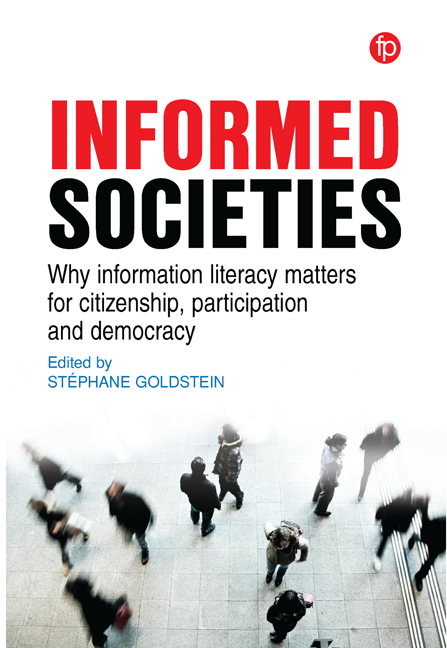Book contents
- Frontmatter
- Contents
- Figures and Tables
- Notes on the authors
- Foreword
- Introduction
- 1 Information Literacy in the Digital Age: Why Critical Digital Literacy Matters for Democracy
- 2 The Discourses of Power, Information and Literacy
- 3 What Intellectual Empathy Can Offer Information Literacy Education
- 4 The ‘Post-Truth’ World, Misinformation, and Information Literacy: a Perspective From Cognitive Science
- 5 Media and Information Literacy: Intersection and Evolution, a Brief History
- 6 Information Literacy and National Policy Making
- 7 Information Literacy as a Growth Pillar for a Fledgling Democracy
- 8 Information literacy and the Societal Imperative of Information Discernment
- 9 Libraries and Democracy: Complementarity in a Regime of Truth
- 10 Scottish Public Libraries Welcome Syrian New Scots: a Transition from Being a Refugee to Becoming an Active Part of the Community
- 11 Information Literacy, Lifelong Learning and the Needs of an Ageing Population
- Index
3 - What Intellectual Empathy Can Offer Information Literacy Education
Published online by Cambridge University Press: 22 February 2020
- Frontmatter
- Contents
- Figures and Tables
- Notes on the authors
- Foreword
- Introduction
- 1 Information Literacy in the Digital Age: Why Critical Digital Literacy Matters for Democracy
- 2 The Discourses of Power, Information and Literacy
- 3 What Intellectual Empathy Can Offer Information Literacy Education
- 4 The ‘Post-Truth’ World, Misinformation, and Information Literacy: a Perspective From Cognitive Science
- 5 Media and Information Literacy: Intersection and Evolution, a Brief History
- 6 Information Literacy and National Policy Making
- 7 Information Literacy as a Growth Pillar for a Fledgling Democracy
- 8 Information literacy and the Societal Imperative of Information Discernment
- 9 Libraries and Democracy: Complementarity in a Regime of Truth
- 10 Scottish Public Libraries Welcome Syrian New Scots: a Transition from Being a Refugee to Becoming an Active Part of the Community
- 11 Information Literacy, Lifelong Learning and the Needs of an Ageing Population
- Index
Summary
Introduction
This chapter explores the roles that affect, social identity and beliefs play in how people engage with information about politically and emotionally charged issues and the implications for information literacy education, particularly in politically polarised times. Considering research from cognitive psychology and education, I also suggest ways to move beyond traditional approaches to information literacy that tend to focus on logic and ‘objectivity’ while neglecting the significance of personal beliefs and social identity to information behaviours. I give particular focus to philosopher Maureen Linker's concept of ‘intellectual empathy’ – ‘the cognitive-affective elements of thinking about identity and social difference’ (Linker, 2014, 12). Intellectual empathy, I argue, is crucial for the kind of critically reflective information literacy that is especially needed in order to foster democratic dialogue and civic engagement in an increasingly diverse and global world.
Background
On the morning of 9 November 2016, I walked into my information literacy classroom at the University of West Georgia disoriented and disillusioned, unsure how to begin talking about a final research project and unsure how much that assignment really mattered now. Along with many other US citizens and residents, I had woken up to news that Donald Trump would be the 45th President of the United States, after he had run a highly divisive campaign that repeatedly played on fears that a more ethnically, racially, and religiously diverse society was a threat to the country's prosperity and ‘values’.
That morning I asked myself how I would start class. My lesson plan seemed ridiculous now, dismissive of the elephant in the room. The previous evening students at an election viewing event had sat on two opposite sides of the room: they had self-segregated themselves by race and political alliances. I had also heard of white students heckling black students about the final outcome of the election. These were signs of the racial and political tension on my campus about which I had heard, but had not witnessed directly. While this wasn't too surprising given my geographic location (a small town in a conservative state) and the student population (racially diverse and primarily first-generation students from the state of Georgia), I hadn't had to confront this reality in the same way before. This was new territory, and I wasn't sure where or how to step.
- Type
- Chapter
- Information
- Informed SocietiesWhy information literacy matters for citizenship, participation and democracy, pp. 47 - 68Publisher: FacetPrint publication year: 2019
- 5
- Cited by

